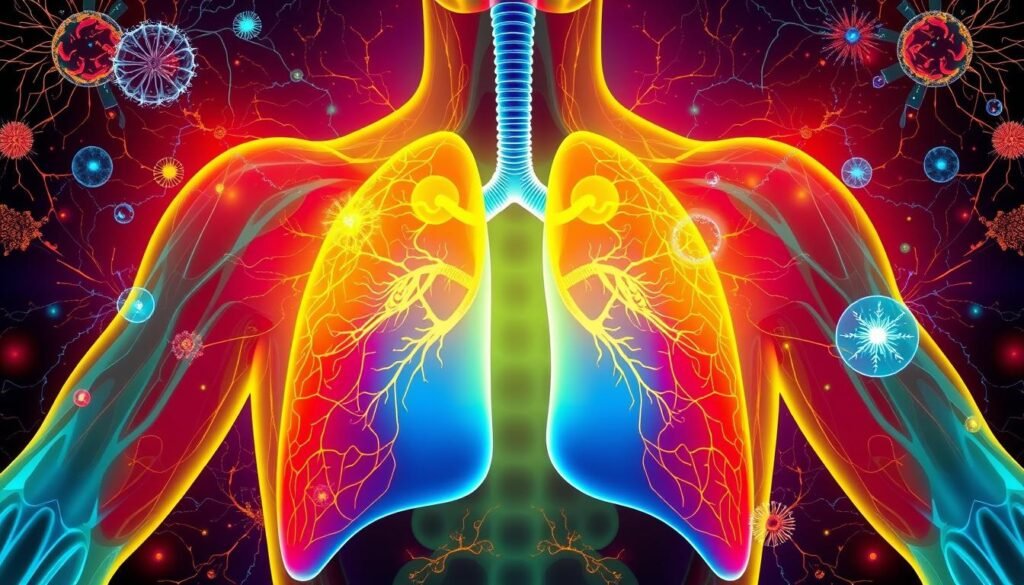Did you know air hunger is the top form of shortness of breath known as dyspnea? It affects many people, especially those with health issues. They often feel they can’t get enough air. This problem can make both your body and mind feel bad. In this article, we look at air hunger anxiety. We explain what causes it, its symptoms, and how to feel better.
Key Takeaways
- Air hunger is the predominant form of dyspnea experienced by many individuals.
- It can lead to increased feelings of anxiety and panic.
- Effective anxiety relief techniques include diaphragmatic breathing and mindfulness meditation.
- Understanding the physiological mechanisms behind breathlessness is key in managing anxiety.
- Air hunger prompts many to seek medical attention due to its distressing nature.
What is Air Hunger?
Air hunger, also known as dyspnea, is when you badly need to breathe more deeply. It’s a key signal from your body, telling you to keep your oxygen and gases balanced. When you feel air hunger, it might seem like you’re suffocating or starving for breath. This can make you very anxious and upset.
Dyspnea can be caused by hard exercise or health issues like lung or heart problems. Signs of this issue include:
- Feeling like gasping for air
- Shallow or rapid breathing
- A sensation of choking or suffocation
- Chest tightness
In panic times, people might breathe too much, making the problem worse. This quick breathing lowers carbon dioxide in your blood. That can make you feel confused, numb, or get a dry mouth. These add to the feeling of needing air badly.
Dyspnea can become a long-term problem, affecting your life and activities. Heart failure, COPD, and anxiety can play big roles in air hunger. Things like genetics, pollution, and other health issues can increase your risk.
Sometimes, dyspnea happens suddenly, making you feel scared or overwhelmed. Severe symptoms like chest pressure or struggling to breathe need immediate attention. Knowing about air hunger helps in finding ways to deal with it and when to get help.
Understanding the Connection Between Anxiety and Breathing Difficulty
Anxiety and breathing trouble are closely linked. When people feel really stressed or scared, they might react physically. They could have a fast heartbeat and breathe shallowly. These reactions come from the body’s urge to either fight or flee. That can make someone feel like they can’t get enough air, making their breathlessness worse.
Many dealing with anxiety say they often feel out of breath. About 23% of patients in medical places say anxiety makes it hard to breathe. Knowing this link is key. It shows that breathlessness can come from anxiety, not just physical issues.
There are good ways to manage this problem. Therapies like CBT and ACT are popular. They help reduce anxiety and make breathing easier. Drugs called beta-blockers might also help with the anxiety’s physical signs.
Having people to support you is very important. Friends, family, and groups can offer the help you need. This support can make dealing with anxiety and breathing difficulties easier. It’s also good to talk to doctors about these problems. This can improve your life quality.
Learning about lifestyle changes is also helpful. It can lead to better long-term health for those with anxiety and breathing difficulty.
Common Symptoms of Air Hunger Anxiety
Air hunger anxiety comes with various signs that may worry people. A key sign is feeling like you can’t breathe properly. This often makes people want to yawn or breathe deeply. Fast, short breaths also happen, making the anxiety worse.
There are other signs of a panic attack too. These include a racing heart, sweating, or a sense of danger. When these mix with feeling dizzy or light-headed, it’s usually because of breathing too fast.
Knowing these signs of air hunger anxiety helps people understand what they’re going through. It’s important to tell them apart from other health issues. Being aware helps people find ways to deal with anxiety and its effects.
Physiological Mechanisms Behind Air Hunger
The feeling of needing more air is quite complex. It comes from how our bodies control breathing. When people feel breathing discomfort, it’s often because their brain’s breathing center is triggered more. Hypercapnia, or high carbon dioxide, and hypoxia, a low oxygen state, ramp up the need to breathe. This makes the need for air much stronger.
For many, breathing issues stem from damage caused by various diseases. Dyspnea, a key sign of lung and heart problems, is a big red flag. It’s seen a lot in women with heart attacks. People often say they feel like they’re suffocating or can’t catch enough air. This shows how hard and scary experiencing air hunger can be.
Air hunger is a severe kind of breathing trouble and it feels more dire than pain sometimes. Things like getting older, being female, and having a higher body weight add to breathing problem risks. Around 10% of adults face this issue. It often shows up in the last stages of diseases, making care very hard.
| Factor | Impact on Breathing |
|---|---|
| Age | Increased risk of dyspnea and respiratory issues |
| Gender | Women experience higher rates of dyspnea during myocardial infarctions |
| Body Mass Index (BMI) | Higher BMI correlated with increased breathing difficulties |
| Health Conditions | Respiratory and cardiac diseases enhance the likelihood of experiencing dyspnea |

Air Hunger Anxiety: The Cycle of Anxiety and Shortness of Breath
Many people struggle with the cycle of anxiety and shortness of breath. Anxiety can cause fast breathing and feeling like you can’t get enough air, which we call air hunger anxiety. This can make you feel like you’re suffocating, making the anxiety even worse. It makes people very aware of how they breathe. The emotional impact of breathlessness can cause deep feelings of hopelessness.
Shortness of breath can also come from different health issues, the National Institutes of Health says. Issues like OCD, generalized anxiety disorder, and panic disorder can make this worse. These problems disturb daily life and increase feelings of air hunger.
It’s important to break this cycle to manage air hunger anxiety. Taking a short break, five to ten minutes, can help you think less about your breathing. This can show you that it’s not an emergency. Various exercises, some shown in popular TikTok videos, can help change how you think about breathing. They combine focusing and moving.
Coming to terms with the uncertainty of health issues is key to handling anxiety better. Taking steps to control this can improve how you breathe and reduce anxiety. Experts, like Dr. Kwan Kin Pang, offer methods that help you deal with these feelings. These methods can bring more peace of mind.
If you want more tips on controlling air hunger anxiety, looking into practical exercises is a good idea. By learning to handle feelings of not being able to breathe well, people can start to feel more in control of their breathing.
Hyperventilation and Its Effects on Breathing
Hyperventilation happens when you breathe too fast, usually because you’re upset. This leads to not enough carbon dioxide in your blood. Symptoms include feeling dizzy, tingling, and needing air. People with anxiety might hyperventilate more because stress makes them breathe faster.
Managing anxiety naturally is key to dealing with hyperventilation. Using deep belly breathing and being mindful can help. Knowing how hyperventilation affects you is also useful. It helps you know what triggers your rapid breathing and how to control it.

Hyperventilation is common in people aged 15 to 55, especially women. Symptoms can last 20 to 30 minutes and make anxiety worse. If you often have these problems, finding hyperventilation treatment can help avoid bigger issues. This is crucial if an illness is causing your hyperventilation.
It’s important to know why you hyperventilate. Panic attacks, stress, and illnesses like pneumonia or asthma can cause it. Changing how you sit or relax can ease the symptoms. These steps can improve your health overall.
Any treatment should help with symptoms and the causes of hyperventilation. Mild cases might get better with home remedies. But, if symptoms are worse, you might need to see a doctor for more help.
Effective Breathing Techniques for Managing Anxiety
Effective breathing techniques are key to lessening anxiety and handling shortness of breath. These breathing exercises for anxiety are very helpful. Diaphragmatic breathing and pursed lip breathing help control your breathing and relax.
Diaphragmatic breathing uses your diaphragm fully, improving your lungs and calming you down. This increases your oxygen intake and lowers blood pressure. It makes your mind peaceful. Pursed lip breathing, on the other hand, is about breathing out slowly and keeping CO2 levels right.
Using these effective breathing techniques every day can change how you deal with anxiety. Doing them regularly is a natural way to fight the symptoms of anxiety disorders. These include general anxiety disorder and panic attacks.
If you want to better manage your anxiety, try adding these techniques to your day:
| Breathing Technique | Benefits |
|---|---|
| Diaphragmatic Breathing | Makes lungs work better and reduces blood pressure |
| Pursed Lip Breathing | Improves air exchange and eases breathlessness |
| 4-7-8 Breathing | Quickly soothes the nervous system |
| Box Breathing | Keeps stress under control |
| Cyclic Sighing | Lowers anxiety in less than five minutes |
Knowing how breathing affects your feelings helps use these natural methods for managing anxiety well. For more advice on dealing with shortness of breath, check out the resources at this link.
Natural Methods for Managing Air Hunger Anxiety
Many natural ways can help deal with air hunger anxiety. Mindfulness is key, helping people stay in the present. This can make you less anxious. Learning to focus on your breath calmly is important. It helps ignore the panic that air hunger can cause.
Being active is another great approach. It makes you healthier and can ease anxiety from air hunger. Make sure to drink plenty of water too. Water keeps your lungs working well and stops dehydration from making breathing hard.
What you eat affects your breathing and anxiety too. Some find black coffee helpful for easing trouble breathing. Ginger might relax your air passages. It’s good for those feeling anxious about air hunger. Trying these natural methods can give you control over your anxiety.
| Technique | Description | Benefits |
|---|---|---|
| Mindfulness Meditation | Focus on breath without judgment | Reduces anxiety and enhances breathing control |
| Regular Physical Activity | Engages in moderate exercise | Improves lung function and reduces anxiety symptoms |
| Hydration | Drinking adequate water | Maintains lung function and reduces breathlessness |
| Dietary Adjustments | Including ginger and caffeine in the diet | Promotes airway health and manages symptom severity |
If you often find it hard to breathe, it’s wise to talk to a doctor. They can find out why and suggest how to deal with it, especially for anxiety-related cases. For more on how to manage breathing problems, check out this resource.

When to Seek Medical Advice for Breathing Problems
Air hunger might mean there are serious issues that need quick help. Knowing when to get medical advice for breathing troubles is key. Do not overlook symptoms like ongoing or bad shortness of breath, as they could be signs of health problems.
If someone has extra worrying signs, like chest pain, wheezing, or fainting spells, seeing a doctor is vital. Diseases like asthma, COPD, or heart problems can really impact how well you breathe. Catching these issues early usually means better chances at managing them.
Smoking a lot over time is the top reason people get COPD, but stopping smoking can help slow it down. Working out regularly can make you fit and build stamina to deal with symptoms. Also, not taking your lung or heart meds as directed can make breathing issues worse, so stick to your doctor’s orders.
Tests like checking lung function, measuring blood oxygen, and scans can help find out why you’re short of breath. If you suddenly can’t breathe well, especially with other scary symptoms, get help right away. These actions can improve how you manage your breathing issues and your overall health.
Conclusion
Air hunger anxiety is hard because it mixes how we feel inside and our breathing. By learning how anxiety changes our breathing, we can start to deal with it better. Knowing about it helps us find ways to feel less upset when we can’t breathe well.
Using special breathing ways helps a lot. Also, trying natural methods can make a big difference for people with air hunger. Studies say that making our lungs fuller can make air hunger less bad. Good breathing habits are key for feeling better overall.
In the end, handling air hunger means understanding both our bodies and our feelings. Knowing about what causes this feeling helps. This lets people live their lives more smoothly and confidently.